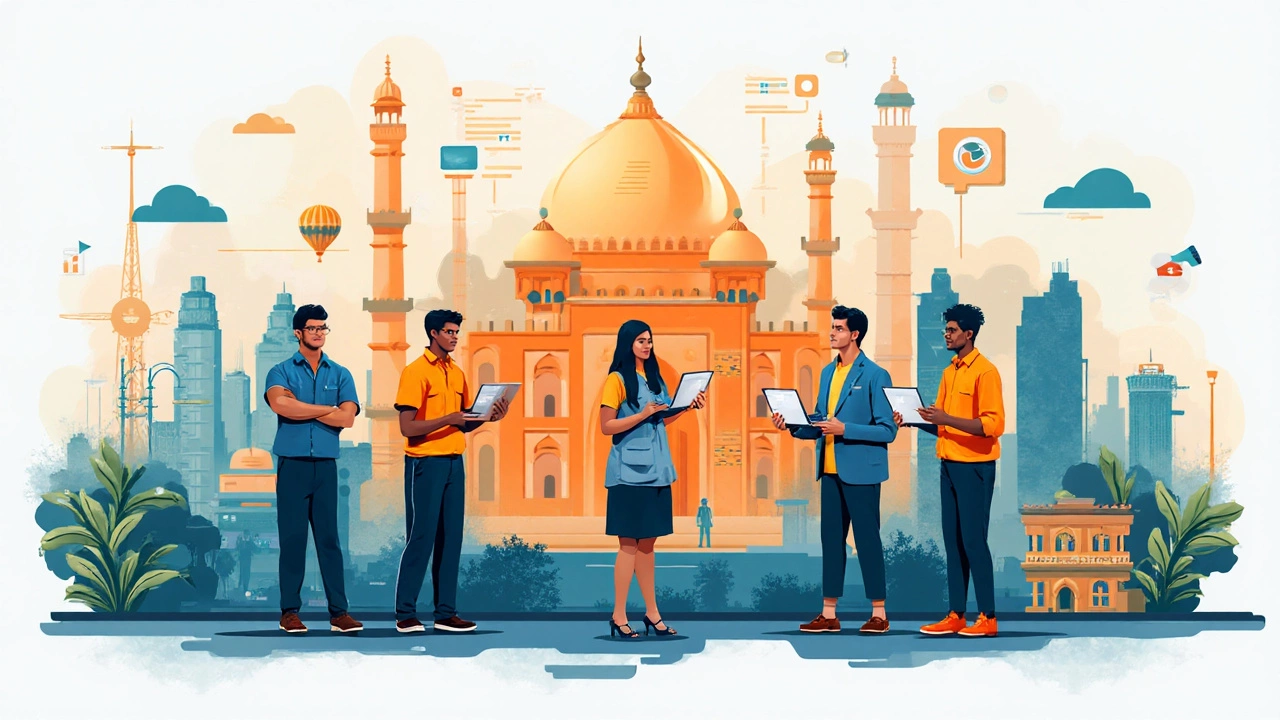Anyone can call themselves an expert these days, but the secret sauce to a better job, a smarter side hustle, or just a groovier life? Figuring out what to actually learn online right now. Short answer: it’s not just coding and languages, but there’s a science behind what’s surging—and it’s smarter to choose based on where the world’s headed rather than what your neighbor brags about at brunch. In 2025, you could master AI tools in your sweatpants, land a work-from-wherever job, or pick up a skill nobody expected to be huge only a year ago. One click and you’re ahead of the curve—it’s not just convenient, it’s a cheat code for real-world wins.
Trends Changing What We Learn Online
Let’s get it straight: online learning isn’t just YouTube hacks or boring webinars anymore. Platforms like Coursera, Udemy, and edX host over 700 million learners globally (courtesy of Class Central’s 2024 global MOOC report). Massive brands like Microsoft, Google, and Amazon run their own learning programs now. So why this explosion? First, tech’s evolving monthly—AI, automation, and remote work have nudged everyone to update their toolkits or get left behind. In 2025, over 65% of jobs require digital skills, up from less than half in 2015. That’s a massive shift in one decade.
The pandemic turbocharged this. Skills like video editing, graphic design, coding, and machine learning aren’t just for specialists—they’re for everyone. A bunch of free courses even let you tinker before paying a rupee. But what’s really taken off is learning that sticks: interactive quizzes, peer feedback, project work, and mentorship, not just cramming for a certificate. Newer platforms match you with real-world projects, so you can't just cruise by clicking Next. The pressure's on for practical, job-ready skills.
Tech isn’t the only star here. People around the world are hopping onto online language classes like Duolingo and Babbel—not just for travel, but to unlock global work, remote teams, or even expat life. Personal finance and investing have soared since 2023: think cryptocurrency basics, budgeting skills, or learning to read a stock chart. Even DIY stuff—from baking to carpentry—has gone digital. Odd fact: searches for "how to unclog a drain online" tripled between 2020 and 2025, according to Google Trends, so no skill is too random to learn anymore.
What does all this tell you? The best thing to learn online is whatever gets you ahead in the real world, whether that’s your career, your sanity, or your Saturday night side project. It’s about future-proofing yourself. But some skills have a clear edge—from data wrangling tools to digital marketing and creative tech.
| Category | Skills Most in Demand (2025) | Free/Low-cost Platform Examples |
|---|---|---|
| Tech & Coding | Python, AI/ML, Cybersecurity, App Development | Coursera, Codecademy, freeCodeCamp |
| Business & Marketing | Digital Marketing, Copywriting, Data Analytics | LinkedIn Learning, Google Skillshop |
| Creative | Video Editing, Graphic Design, UX/UI, Animation | Canva Academy, Skillshare |
| Languages | Spanish, Mandarin, French, Hindi | Duolingo, italki |
| Personal Finance | Investment Basics, Crypto Trading, Tax Filing | Khan Academy, Coursera |

Skills That Pay Off: What Should You Actually Learn?
Let’s be real—most folks aren’t going to master quantum physics overnight, and not every online course is worth the hype. But you want a skill that’s proven to open doors and pay bills, right? Start with the stuff that gets you noticed by employers or lets you launch your own gig from the couch.
Best thing to learn online in 2025? Pretty much anything to do with AI, no surprise there. Generative AI boomed after 2023—OpenAI’s GPT series, Google’s Gemini, and Meta’s LLaMA have become household names. Companies are desperate for people who can use, prompt, and even fine-tune these tools. Learning prompt engineering is a hidden gem; Glassdoor says jobs requiring AI prompt skills have tripled since 2023. Short AI courses on DeepLearning.AI or LearnPrompting.org let you start in a weekend.
Now, let’s talk coding. Python still wins for beginners (and even non-engineers) because it shows up everywhere: websites, data analysis, even automating boring work tasks. freeCodeCamp’s free, hands-on projects have become a must-try. If you’d rather design than code, digital design tools like Figma and Canva are in nearly every company’s toolkit. Figma’s user community grew to 18 million in 2024, and a UX design skill can fast-track you into tech—even if you have a creative, not a technical mind.
Some think languages are just a school thing, but online language skills open global jobs—and friendships. Spanish is the most-learned language on Duolingo, and remote gigs value bilingual hires. Even if your accent’s not perfect, getting conversational in another language is much more valuable than memorizing flashcards for a test. Trust me, my wife Lana picked up conversational Japanese last year using Busuu in just 20 minutes a day. She’s now working with a Tokyo-based client and loves it.
Data skills might sound boring but they’re a gold mine. Data analysis, visualization, and spreadsheet mastery (think: Excel, Google Sheets, Tableau) show up in job postings across every industry, from healthcare to sports analytics. Most people ignore them thinking they're only useful for finance bros, but you’ll be shocked at how quickly those skills lead to a raise or an extra freelance gig. LinkedIn’s 2025 Workplace Report showed "data analyst" as one of the top three roles in almost every country.
Don’t skip creative and business skills. Everyone’s a content creator now: video editing with CapCut or Adobe Premiere, making cool Instagram posts with Canva, or learning to podcast. Even if you’re not vying to be TikTok-famous, these creative tools level up your resume, your business outreach, or boost the side hustle you’ve dreamed about. Add digital marketing, SEO, and copywriting to that list—they let you sell anything online and build brands, even for your own hobby project.
And then, there’s the timeless humans skills that never go out of style—critical thinking, negotiation, and emotional intelligence. LinkedIn courses on business communication, negotiation, and soft skills are wildly popular, especially as remote jobs demand clear communication and self-motivation. Companies are putting more focus on hiring people who can think, manage time, and play nice with teammates worldwide—no robot’s going to replace that soon.

Making the Most of Online Learning: Winning Strategies and Real Talk
So, you’ve found the dream skill. Now what? Honestly, starting is the easy part—sticking with it separates the legend from the one-click wonder. Most people give up before week two (Coursera’s average course completion rate is less than 15%). But that’s just because binge-watching lessons doesn’t stick in your head. Here’s the inside scoop on winning at online learning.
- Pick a skill that solves your actual problem. Want a job? Learn something in-demand. Need to run your own business? Try digital marketing or bookkeeping. Hate your spreadsheet at work? Get Excel supercharged. The closer a skill is to your daily life, the faster you’ll stick with it.
- Go hands-on fast. Platforms like Codecademy put you straight into projects. Udemy or YouTube have DIY challenges for every topic. Even language apps like Tandem let you chat with real people from lesson one, instead of just clicking flashcards.
- Build a habit, not a binge. Twenty minutes every morning after coffee is better than four hours once a month. Apps send reminders, but setting a calendar event or studying alongside a buddy works even better—every successful online learner I know checks in with a friend or community group.
- Make it public. Announce your goal, share your progress, or post a project online. This tiny burst of "accountability" keeps you from disappearing into the back row (it works—I went from zero to building my first website after I bragged about it on Twitter).
- Track actual outcomes. Don’t just collect certificates—apply that skill: automate a work task, land a freelance job, or help a friend. You only really know something when you can use it in real life.
One bonus: most top platforms offer some form of certification, portfolio, or peer review—so you can show off your skills. That matters if you’re job-hunting or want to stand out on LinkedIn. Over 30% of hiring managers in 2025 now say they care more about "proof of skill" (a project, website, or portfolio) than a college degree.
And don’t fall into the trap of hopping from course to course. Focus wins every time. Too many options can actually slow you down—stick to one or two core things. If you're struggling, switch up HOW you learn: try video, podcast, live sessions, or a phone app. Sometimes it’s not the topic, but the format that clicks. Lana, for example, tried three language apps before finding one that fit her schedule and vibe.
Costs are lower than ever: most platforms have free trials or even "audit" tracks, where you access all lessons minus the certificate. Even paid courses, like Google’s Digital Garage or IBM’s Data Science track, cost less than a new pair of sneakers. That’s wild compared to old-school tuition rates.
Looking for something unusual? Masterclass teaches personal branding from icons like Anna Wintour, or you can pick up survival skills from Bear Grylls. There’s a course for every weird interest, which is half the fun.
Truth is, learning online in 2025 isn’t about someday—it’s about now. The world changes fast, but the ones grabbing new skills online? They’re not stressed, they’re prepared. Why wait until you have to catch up? Get curious, dive in, and make sure the next brag at brunch is actually all about you.


